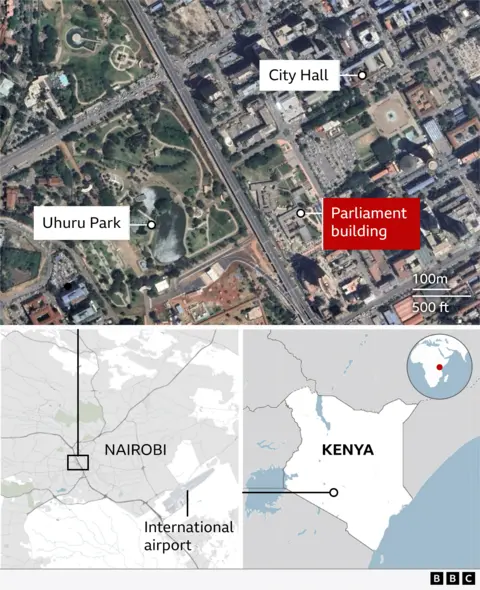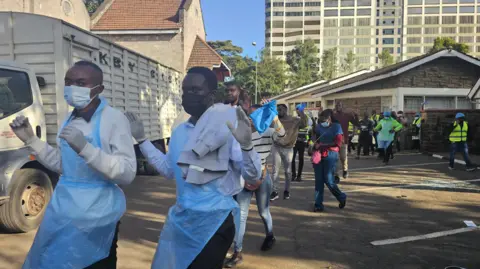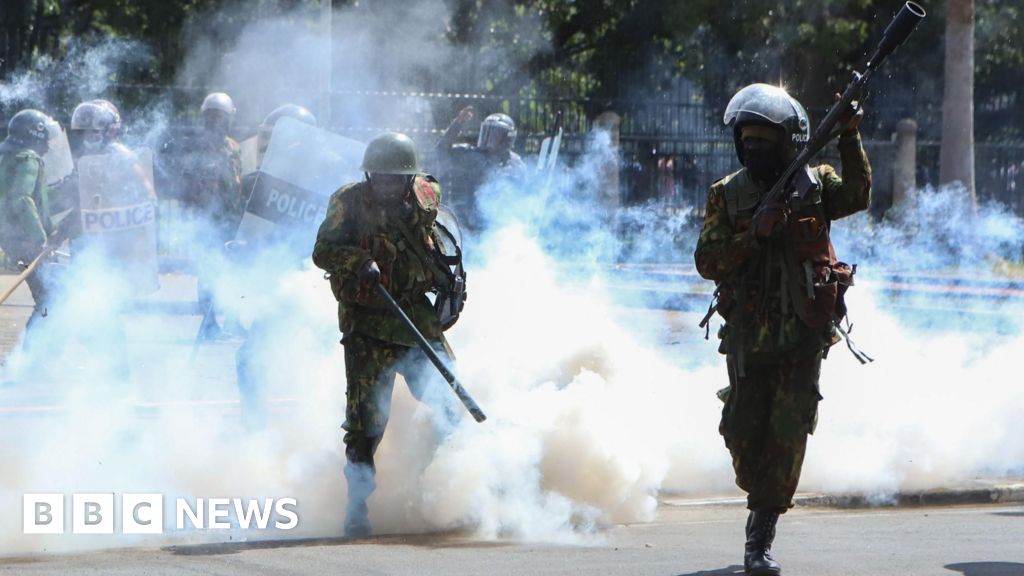By Basillioh Rukanga & Ido Vock, BBC News, Nairobi and London
At least five protesters were shot dead by police in Kenya and a section of parliament went up in flames as demonstrations against new tax proposals intensified on Tuesday.
An angry crowd broke through police barriers to storm parliament in the capital Nairobi before setting parts of it on fire.
In a speech on Tuesday afternoon, President William Ruto said all means would be deployed to “thwart any attempt by dangerous criminals to undermine the security and stability of our country”.
He has deployed the army to quell the protests.
Protests against an unpopular finance bill, which includes several tax rises, have raged for days but intensified on Tuesday when MPs approved an amended bill.
Protesters broke into parliament, vandalized the interior and set parts of the complex on fire. The ceremonial mace, which symbolizes the authority of the legislature, was stolen.
Police opened fire with live ammunition, killing at least five people, according to the Kenya Medical Association. A BBC reporter at the scene reported seeing bodies lying in the street in pools of blood.
“There are some things that are difficult to understand, such as how can a 16% tax be imposed on bread? How can sanitary pads be taxed?” Derrick Mwathu, 24, told the BBC, referring to some of the proposals contained in the original bill.
President Ruto promised a tough response to what he called “violence and lawlessness”.
“It is not appropriate, or even conceivable, that criminals posing as peaceful protesters can sow terror against the people, their elected representatives and the institutions established under our constitution and expect to go unpunished,” Mr Ruto added.
UN Secretary-General Antonio Guterres said he was “deeply saddened by reports of deaths and injuries – including journalists and medical staff – related to protests and street demonstrations in Kenya.”
He also urged Kenyan authorities to “exercise restraint” and called for all protests to be peaceful.

Hundreds of people were reportedly injured, including by rubber bullets and tear gas. At a Nairobi cathedral, where a medical camp had been set up to treat injured protesters, a BBC journalist witnessed soldiers forcing doctors out of the building.
Another temporary unit was set up outside the Kenyatta National Hospital emergency unit.

Former President Uhuru Kenyatta urged dialogue, saying Kenya’s leaders should “know that power and authority are gifted to them by the people.”
Although the government has rejected some proposals in the original bill, protesters demanded that it be withdrawn in its entirety.
Maureen Awuor, 23, said: “Our voice needs to be heard… We are the upcoming generation, so they need to listen to us.”
The protests have made headlines across Africa and other parts of the world.
Two of Africa’s leading anti-establishment figures, Ugandan opposition leader Bobi Wine and radical South African politician Julius Malema, have expressed support for the protesters.
Western countries have expressed concern about the violence and urged calm.
You might also be interested in:
 Getty Images/BBC
Getty Images/BBC
